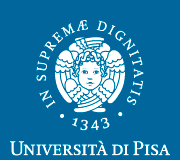
Contatti: a.buongusto@phd.unipi.it
Supervisore tesi: Prof. Sergio Saia
Titolo Progetto: Sostenibilità, produttività e attitudine foraggera di sistemi colturali basati sul Fico d’india
Abstract: Le sfide che l’agricoltura dovrà affrontare in futuro sono complesse e molteplici. L’obiettivo è quello di aumentare contemporaneamente la produzione di alimenti sia vegetali che animali, diminuendo drasticamente il rilascio di gas serra e, allo stesso tempo, aumentando l’efficienza d’uso delle risorse naturali come acqua, terra, ecc. Finora, la maggior parte della superficie terrestre è soggetta a processi sia di desertificazione che di desertizzazione, e la siccità sta ponendo forti preoccupazioni sulla produzione di alimenti e mangimi. Per ovviare a questi problemi, è fondamentale implementare la coltivazione di specie vegetali nuove o sottoutilizzate, adattate ad ambienti aridi e terreni marginali. Una specie adatta è il pero cactus (Opuntia ficus-indica L., di seguito OFI). L’OFI ha un particolare sistema fotosintetico che consente alla specie di fissare la CO2 ad alta temperatura e bassa concentrazione di CO2, e una ricchezza di adattamento fisiologico e morfologico che consente alla pianta di resistere a una siccità prolungata. L’OFI ha un grande potenziale, nonostante alcune limitazioni, come coltura foraggera. Inoltre, si è visto che ha un grande potenziale produttivo ed economico anche per la produzione di frutta e anche di biogas. Nella mia tesi di dottorato verranno studiate la sostenibilità, la produttività e l’idoneità foraggera del fico d’India nei sistemi colturali. Studierò le criticità e le potenzialità di questo impianto per la biomassa foraggera e la sua idoneità per l’alimentazione animale, e per un utilizzo come biogas.
Project Title:
Sustainability, Productivity, and Forage Potential of Cropping Systems Based on Prickly Pear Cactus (Opuntia ficus-indica)
Abstract:
The challenges that agriculture will face in the future are complex and multifaceted. The goal is to simultaneously increase the production of both plant-based and animal-derived foods, while drastically reducing greenhouse gas emissions and improving the efficiency of natural resource use, such as water and land. To date, a large portion of the Earth’s surface is affected by both desertification and land degradation processes, and drought is raising serious concerns about food and feed production. To address these issues, it is essential to promote the cultivation of new or underutilized plant species that are well-adapted to arid environments and marginal lands. One such species is the prickly pear cactus (Opuntia ficus-indica L., hereafter OFI). OFI has a unique photosynthetic system (CAM – Crassulacean Acid Metabolism) that allows it to fix CO₂ efficiently under high temperatures and low CO₂ concentrations. It also exhibits a wide range of physiological and morphological adaptations that enable it to withstand prolonged drought conditions. Despite some limitations, OFI has great potential as a forage crop. Additionally, it has shown promising productive and economic potential for fruit production and biogas generation. In my PhD thesis, I will investigate the sustainability, productivity, and forage suitability of Opuntia ficus-indica within cropping systems. I will evaluate the challenges and opportunities associated with using this species for forage biomass production, its suitability for animal feed, and its potential use in biogas production.
Poster a congresso:
- Trotta V., Buongusto A.A., Forlano P., Caccavo V., Battaglia D. Plasticità fenotipica ed effetti materni in afidi sottoposti a restrizioni alimentari. XXXVII Congresso Nazionale Italiano di Entomologia. Palermo, Italia.
- Buongusto A,A. Sustainability, productivity and forage suitability of cultivation systems based on the prickly pear. Game of Research. Giornata di promozione della ricerca a Scienze Veterinarie, Pisa.
